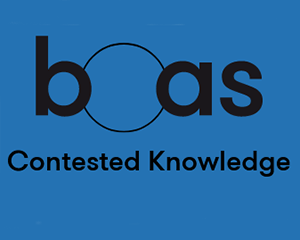Sabine Mannitz and Larissa-Diana Fuhrmann are presenting a workshop at the conference of the German Anthropological Association (DGSKA) on the topic “Umstrittenes Wissen / Contested Knowledge: Anthropological Perspectives”. Their one-day workshop on July 26, 2023 is entitled “Representations of Political Violence in Museological Spaces: Decolonial Strategies, Contested Memory, and Transformative Potential.” Sabine Mannitz and Larissa-Diana Fuhrmann will thus deepen the topic of their blog post for Boasblog, published in July 19, 2023, which discusses the normative impact of museum displays through selected examples.
Museums have an important role in disseminating normative images and narratives of political violence. They highlight certain forms, moments, and motifs of violent action while leaving others invisible. They create offers for collective interpretations and thus participate in the highly political practice of demarcating legitimate and illegitimate violence: what counts as “terrorism,” what as “liberation struggle,” “defense,” or “insurgency”? Which actors were and are authorized to use violence to achieve their goals and when? Whose story should be told, what should remain unmentioned?
Postcolonial perspectives have revealed the legitimizing and power-maintaining functions of many established narratives and images in museum spaces, and their contentiousness. Debates are being held and procedures developed for the repatriation of artifacts that have ended up in museums by means of coercion and violence, especially those of former colonial states. The justifications and concepts associated with such collections have come under pressure, as have euphemistic representations of conquest and subjugation. At the same time, new representations of historical as well as contemporary political violence are emerging; in the course of decolonization of collections and exhibitions, in the museum reappraisal of civil wars, history of domination and human rights crimes, but also through targeted stagings of today's violent actors.
The workshop examines the forms and bodies of knowledge used in museum contexts to commemorate political violence and asks about their transformative potential for the social processing of experiences of violence: Which interpretations of violence are suggested to the audience? Who determines them, and with what intention? Are decolonial strategies and forms of co-production used? What findings are available on effects?
Nine speakers will contribute empirical, theoretical or curatorial contributions: Zoë De Luca (McGill University), Birgit Bräuchler (University of Copenhagen) together with Alexander Supartono (Edinburgh Napier University), Anika Oettler (Philipps University Marburg), Sabine Mannitz (PRIF) together with Rita Theresa Kopp (University of Jena), Kaya de Wolff (Goethe University Frankfurt), Sebastian Köthe (Zurich University of the Arts), and Larissa-Diana Fuhrmann (University of Mainz).
The four-day DGSKA conference will take place in Munich, Germany, July 25-28, 2023, and will be organized by DGSKA together with the Munich Institute of Ethnology.
For more information on the DGSKA conference and the entire program, please visit the DGSKA website.
